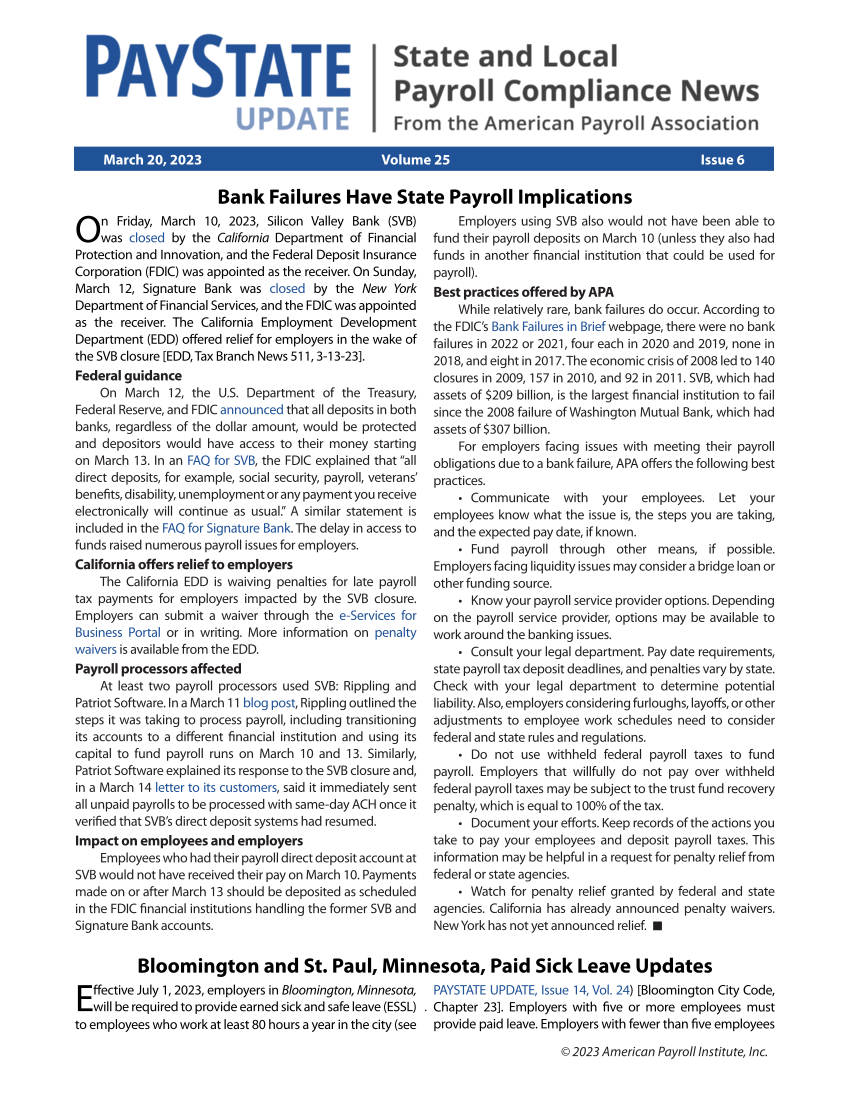© 2023 American Payroll Institute, Inc. Bank Failures Have State Payroll Implications On Friday, March 10, 2023, Silicon Valley Bank (SVB) was closed by the California Department of Financial Protection and Innovation, and the Federal Deposit Insurance Corporation (FDIC) was appointed as the receiver. On Sunday, March 12, Signature Bank was closed by the New York Department of Financial Services, and the FDIC was appointed as the receiver. The California Employment Development Department (EDD) offered relief for employers in the wake of the SVB closure [EDD, Tax Branch News 511, 3-13-23]. Federal guidance On March 12, the U.S. Department of the Treasury, Federal Reserve, and FDIC announced that all deposits in both banks, regardless of the dollar amount, would be protected and depositors would have access to their money starting on March 13. In an FAQ for SVB, the FDIC explained that “all direct deposits, for example, social security, payroll, veterans’ benefits, disability, unemployment or any payment you receive electronically will continue as usual.” A similar statement is included in the FAQ for Signature Bank. The delay in access to funds raised numerous payroll issues for employers. California offers relief to employers The California EDD is waiving penalties for late payroll tax payments for employers impacted by the SVB closure. Employers can submit a waiver through the e-Services for Business Portal or in writing. More information on penalty waivers is available from the EDD. Payroll processors affected At least two payroll processors used SVB: Rippling and Patriot Software. In a March 11 blog post, Rippling outlined the steps it was taking to process payroll, including transitioning its accounts to a different financial institution and using its capital to fund payroll runs on March 10 and 13. Similarly, Patriot Software explained its response to the SVB closure and, in a March 14 letter to its customers, said it immediately sent all unpaid payrolls to be processed with same-day ACH once it verified that SVB’s direct deposit systems had resumed. Impact on employees and employers Employees who had their payroll direct deposit account at SVB would not have received their pay on March 10. Payments made on or after March 13 should be deposited as scheduled in the FDIC financial institutions handling the former SVB and Signature Bank accounts. Employers using SVB also would not have been able to fund their payroll deposits on March 10 (unless they also had funds in another financial institution that could be used for payroll). Best practices offered by APA While relatively rare, bank failures do occur. According to the FDIC’s Bank Failures in Brief webpage, there were no bank failures in 2022 or 2021, four each in 2020 and 2019, none in 2018, and eight in 2017. The economic crisis of 2008 led to 140 closures in 2009, 157 in 2010, and 92 in 2011. SVB, which had assets of $209 billion, is the largest financial institution to fail since the 2008 failure of Washington Mutual Bank, which had assets of $307 billion. For employers facing issues with meeting their payroll obligations due to a bank failure, APA offers the following best practices. • Communicate with your employees. Let your employees know what the issue is, the steps you are taking, and the expected pay date, if known. • Fund payroll through other means, if possible. Employers facing liquidity issues may consider a bridge loan or other funding source. • Know your payroll service provider options. Depending on the payroll service provider, options may be available to work around the banking issues. • Consult your legal department. Pay date requirements, state payroll tax deposit deadlines, and penalties vary by state. Check with your legal department to determine potential liability. Also, employers considering furloughs, layoffs, or other adjustments to employee work schedules need to consider federal and state rules and regulations. • Do not use withheld federal payroll taxes to fund payroll. Employers that willfully do not pay over withheld federal payroll taxes may be subject to the trust fund recovery penalty, which is equal to 100% of the tax. • Document your efforts. Keep records of the actions you take to pay your employees and deposit payroll taxes. This information may be helpful in a request for penalty relief from federal or state agencies. • Watch for penalty relief granted by federal and state agencies. California has already announced penalty waivers. New York has not yet announced relief. Bloomington and St. Paul, Minnesota, Paid Sick Leave Updates Effective July 1, 2023, employers in Bloomington, Minnesota, will be required to provide earned sick and safe leave (ESSL) to employees who work at least 80 hours a year in the city (see PAYSTATE UPDATE, Issue 14, Vol. 24) [Bloomington City Code, Chapter 23]. Employers with five or more employees must provide paid leave. Employers with fewer than five employees March 20, 2023 Volume 25 Issue 6
Printed for: PayrollOrg Bookshelf © 2024 American Payroll Institute, Inc. All Rights reserved. From: PayrollOrg Digital Publications (bookshelf.payroll.org)






